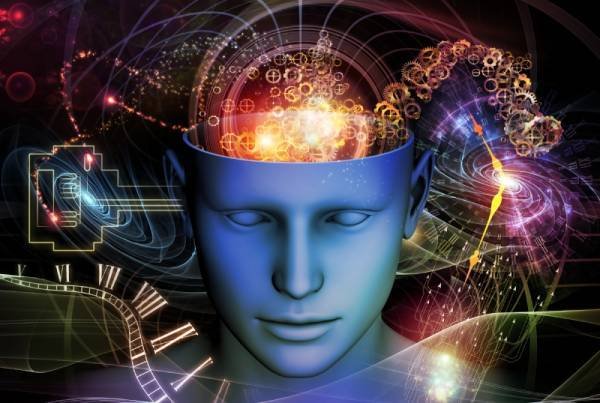
Why is it that the unbridled human mind inclines towards the most negative of outcomes?
As a writer, I all too often feel the sharp grip of anxiety in my throat before sitting down before a blinking cursor and an empty word doc; A blank canvas. When I suffer from writers block - or, well, anxiety - It feels as if there's a physical force blocking my fingers from typing out the words in my mind.
Anxiety is thought transforming into matter and running like an electric current through my cells, zapping my nerves and paralyzing my muscles.
But here's the weird part - there's absolutely no objective, scientific reason I should experience this. Could it simply be my own consciousness that creates a force capable of destroying me? And if that's the case, could the same force be applied to create an opposite effect?
Think Bradley Cooper's character in Limitless. If we objectively regard anxiety as a force, rather than a condition, perhaps we could become capable of harnessing the very same power that breaks us as a power that creates the reality of our wildest dreams. Let's dive into our demons.
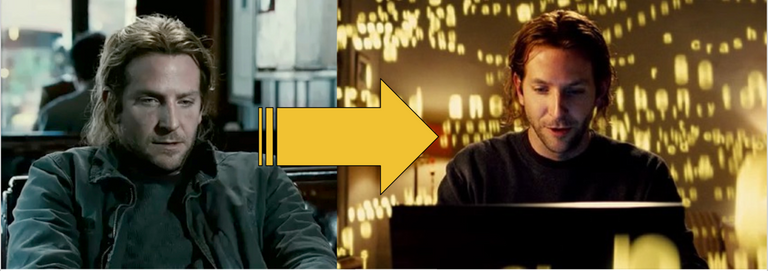
If you're reading this, I'm quite certain you have your maslovian needs met. That is; food, water, a roof over your head, and clothes on your back. Objectively speaking, we live in a world of abundance.
In fact, dear reader, at this very moment you're in possession of three indispensable resources. And with them, anything is possible:
- Time
- A brain
- A wi-fi signal
However, I've noticed (as I'm sure you have as well) the massive amount of negative, anxious-ridden crap that these precious resources have produced. They seep into the nooks and crannies of our brain, collecting like devilish dust-bunnies of fear in the back of our psyche. After all, we are what we consume, and the consumable items that surround us ain't so soothing.
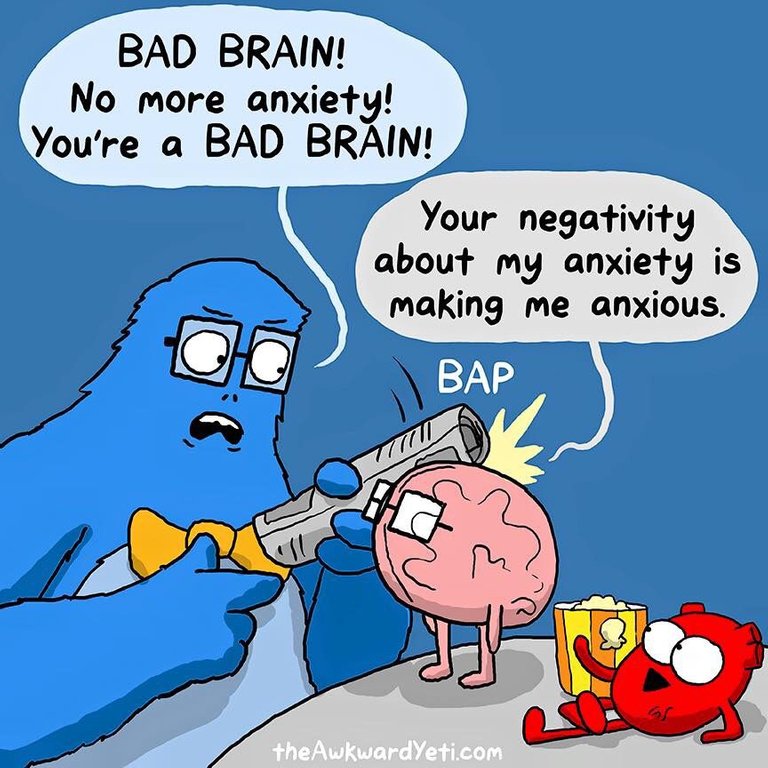
Source: theawkwardyeti.com
Note that the author is bopping his brain with a newspaper. Too often than not, we turn to consume rather than create to quell that dizzy, frightened feeling. We all know that the dramatic voices screaming from our TV sets do us no good, but we consume them because they're just ever so quieter than the muted screams of our own fear.
Take the internet for example: a digital playground, where ideas, art, money, and hope can be shared faster than the speed of light. Yet far too often we're witness to the most negative and exploitative measures by which humans exercise these gifts.
This is why a particular quote struck me, written by the Danish philosopher Søren Kierkegaard:
Anxiety may be compared with dizziness. He whose eye happens to look down the yawning abyss becomes dizzy. But what is the reason for this? It is just as much in his own eye as in the abyss, for suppose he had not looked down. Hence, anxiety is the dizziness of freedom.
The abyss cited by Kierkegaard conjures images of outer space in my mind's eye. To be free is to float in non-gravity, suspended among the stars like Frank in 2001: A Space Odyssey Falling neither up nor down before an infinitely expanding canvas of possibilities.

But Kierkegaard's claim doesn't leave us, er, hanging. If it did, I would've closed my computer, grabbed a bottle of wine and reassumed fetal position. Rather, in between the lines of his statement lies a powerful belief that suggests a way in which we could instead harness our freedom through observation, rather than become a victim of our anxiety:
Freedom succumbs to dizziness. Further than this, psychology cannot and will not go. In that very moment everything is changed, and freedom, when it again rises, sees that it is guilty. Between these two moments lies the leap, which no science has explained and which no science can explain. He who becomes guilty in anxiety becomes as ambiguously guilty as it is possible to become.
If we are able to observe anxiety, free of judgment and guilt, we allow ourselves the space to explore our limitless potential that would be otherwise paralyzing.
Don't look down
Don't be like Frank. Don't lie there, tumbling through the abyss, fumbling in fear until your oxygen runs out and you lay lifeless in non-gravity. 'Cause guess what - you have two feet on the Earth and until the world blows up into tiny radioactive shards, we still got gravity. Forget this, and the human mind takes you astray, into that anxious, brooding, obsessive hell-hole that makes you disregard the power at the tip of your fingers.
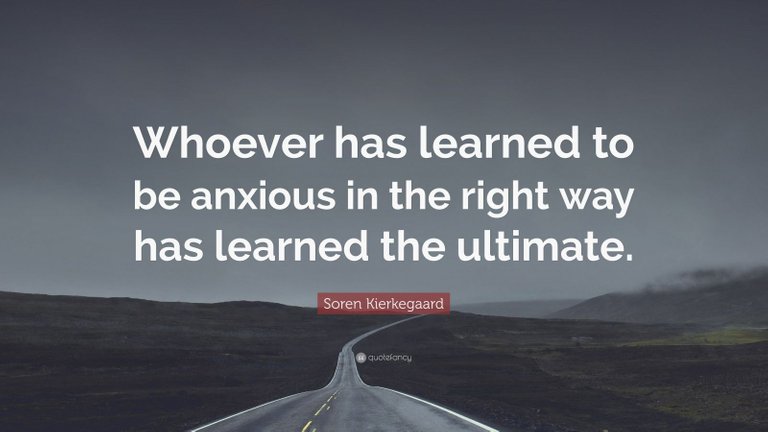
We are made of information to process information.
With the sheer amount of information that we absorb on a daily basis (including this article), our fragile human minds scramble to put the pieces together, constructing meaning, by creating a couple dozen other alternate realities in our head of how our daily story will play out. Don't let it be a shitty story. Observe. Take control.
And hey, after all, I was able to write these words, then you can create your reality like a damn good blog-post, too. Just don't look down.
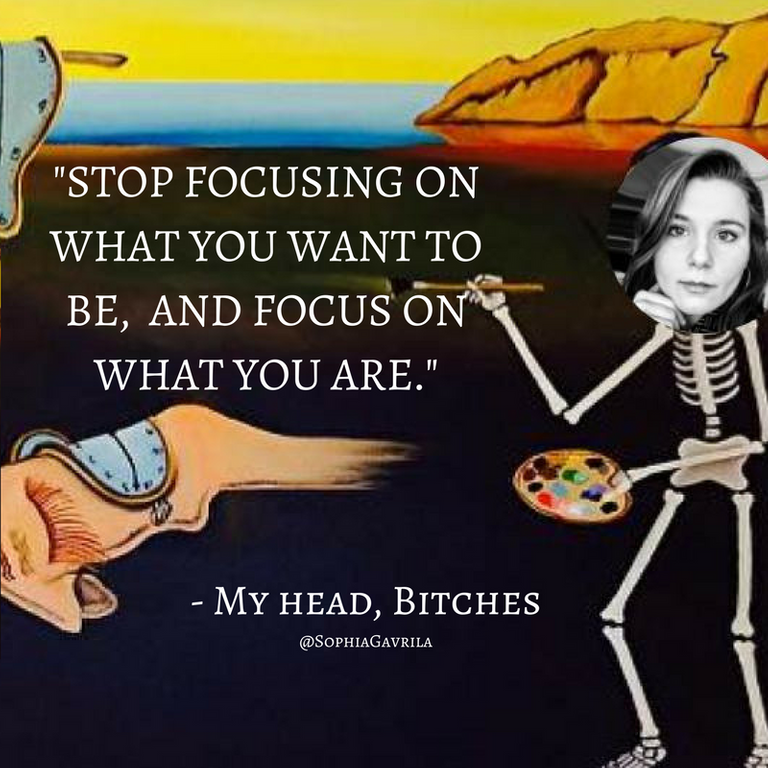
Sophia
¡Atención!
I make my living 100% through donation and cryptocurrency.
If you enjoy the content I throw out into the ethosphere, your contributions are greatly appreciated to keep the ideas flowing 🙏
ETH wallet: 0x7E53F91FdFa479CAbB991C845De6A07D2b5ae7D0